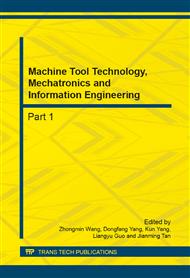p.2128
p.2133
p.2137
p.2143
p.2147
p.2151
p.2155
p.2160
p.2164
Adaptive Clone Selection Algorithm for Function Optimization
Abstract:
In this paper, we present a scheme to improve immune cloning selection algorithm. The improved algorithm, which is referred to as adaptive cloning selection algorithm (ACSA), is proposed and then applied to function optimization. At first, we present adaptive gene mutation which decides mutation probability of each code point (locus) based on the quality of antibodies and the number of evolution iterations. Secondly, we present an iteratively increasing method from one locus to the all ones, which can be used in function optimization. Then, the cloning selection process of evolution is divided into two-stages. The first step is to increase locus of antibodies. In the other one, the Baldwin effect learning operator is employed. And finally, an experiment is carried out to verify the theoretical analyses on several testing functions.
Info:
Periodical:
Pages:
2147-2150
Citation:
Online since:
September 2014
Authors:
Price:
Сopyright:
© 2014 Trans Tech Publications Ltd. All Rights Reserved
Share:
Citation:


